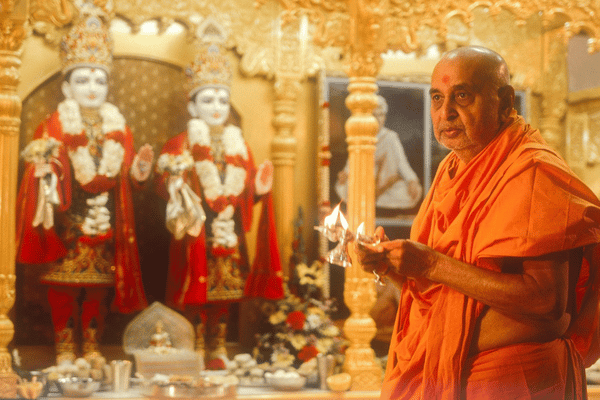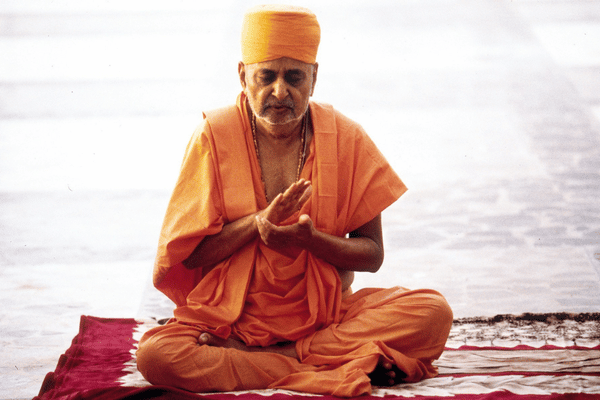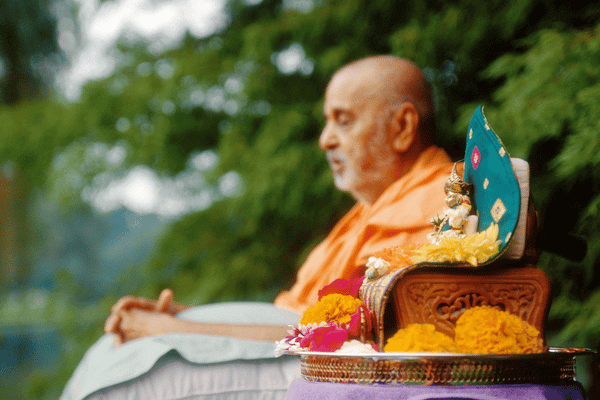An American author from the 1800s, Henry David Thoreau was an advocate of simple living, inspired partly by the Bhagavad Gita, whose teachings he called “stupendous and cosmogonal”. He spent two years in the remote forests of Massachusetts, living alone in his self-made cabin on the shores of Walden Pond. The cabin cost him a mere $28 to build (less than $900 in today’s money), and he relied on civilisation only for the basics, such as clothing and fuel. He even planted a bean field to grow his own food.
After over two years, he ended his experiment with the conclusion that “most of the luxuries and many of the so-called comforts of life are not only not indispensable, but positive hindrances to the elevation of mankind.”
Thoreau’s less-is-more experience agrees with that of many others who have similarly escaped today’s consumerist society. Indeed, Bhagwan Swaminarayan has preached again and again of the dangers of maya, and the reasons for overcoming its temptations. His teachings were embodied by His Holiness Pramukh Swami Maharaj (1921-2016), fifth spiritual successor of Bhagwan Swaminarayan: the life he lived was completely unattached to the mundane world.

On his road travels once in 2009, Pramukh Swami Maharaj’s vehicle was forced to take a detour through his birthplace of Chansad. For most people, this would be a welcome distraction to revive old memories, but Pramukh Swami was unmoved. The sadhus accompanying him began to enthusiastically point out the new mandir, hospital, school, and other BAPS projects in the village. People gathered along the road to felicitate Pramukh Swami, waving and calling out ardently, yet he remained his usual calm and composed self. His entourage may have been surprised at his nonchalance, but it was Pramukh Swami’s detachment as well as nonattachment that was being articulated.
On another occasion, Pramukh Swami Maharaj’s personal attendant Yogicharan Swami joked to him, “Our Guru Shastriji Maharaj used to say that your wrists were too thin. Now that you have reduced the portion size of your meals, it seems we need Shastriji Maharaj to return and tell you the same again.” Pramukh Swami Maharaj replied, “Yes, Swamiji would take great care in seeing that I ate properly. Thanks to his blessings, I developed a healthy appetite, and I was able to put on some weight. However, I don’t have much of an appetite anymore.” For Pramukh Swami Maharaj, eating was never to satisfy the senses, but one more way he could fulfill the command of his guru and offer his devotion to him.
Every day of his life, Pramukh Swami Maharaj reminded us of the definition of detachment from the world.

However, it was more than mere detachment that he transcended. He was asked once, by another attending sadhu Prayagmuni Swami, “Our fourth spiritual leader Yogiji Maharaj wanted satsang to spread through countless universes. He wanted it to reach Japan, China and Russia. Do you have any such wishes?” Pramukh Swami Maharaj answered, “If we can fulfill the wishes made by Shastriji Maharaj and Yogiji Maharaj, that in itself is more than enough. When Yogi Bapa (Yogiji Maharaj) has declared his wishes, what is the need for us to come up with more?”
He was pressed further by devotee Dr Kiranbhai, who said, “At least tell us one of your wishes.”
Yet Pramukh Swami Maharaj maintained, “My only thought is to fulfill each of Yogi Bapa’s wishes. That is the thought which constantly stays with me.”
Evidently, Pramukh Swami Maharaj was so self-effacing that he simply considered himself as a vessel for his guru and Bhagwan Swaminarayan, and his body as a physical means to carry out their wishes.
Thoreau experimented with detachment for two years, and the sadhus of BAPS surpass his feat by vowing to a life of detachment, but Pramukh Swami Maharaj transcended them all: he was ‘jakte anasakta’, or detached from this world, even while he lived within it.
Pramukh Swami Maharaj’s life gave us the strength to realise that even though we are enmeshed in the modern, material world, we can resolve to be detached from it and seek happiness from a purer source: by pleasing Bhagwan Swaminarayan and our guru.
This article series aims to pay tribute to Pramukh Swami Maharaj of the BAPS movement in his birth centennial.
To learn more about Pramukh Swami Maharaj’s life and work, please visit Pramukh Swami Maharaj
READ ALSO: Pramukh Swami Maharaj of BAPS: Compassion for all






